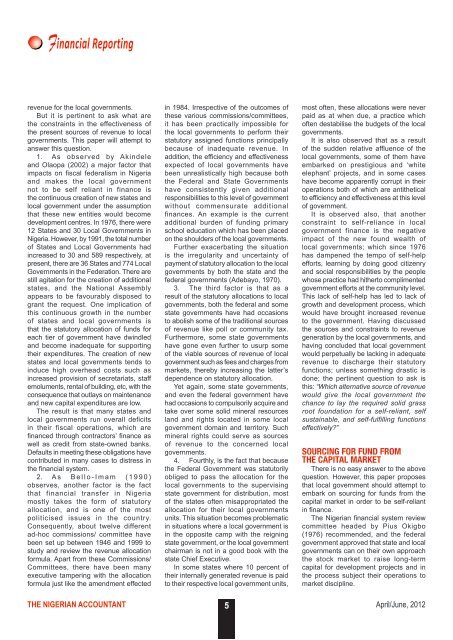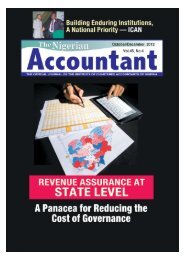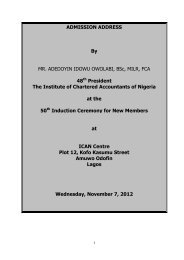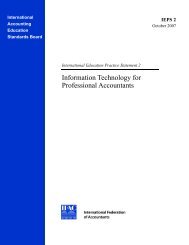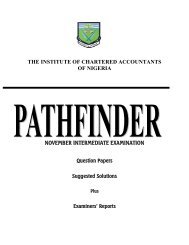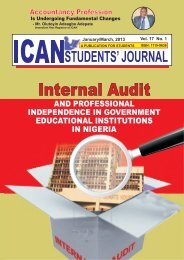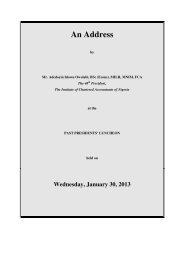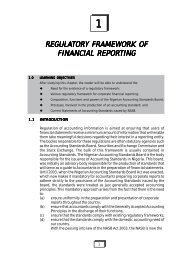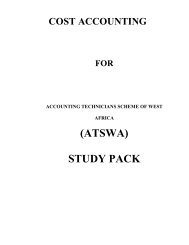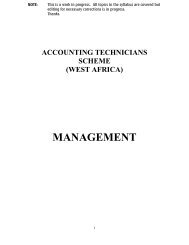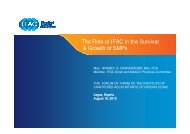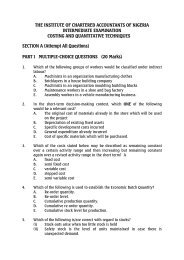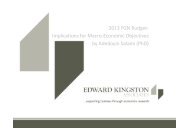The Nigerian Accountant 2012 - The Institute of Chartered ...
The Nigerian Accountant 2012 - The Institute of Chartered ...
The Nigerian Accountant 2012 - The Institute of Chartered ...
You also want an ePaper? Increase the reach of your titles
YUMPU automatically turns print PDFs into web optimized ePapers that Google loves.
Financial Reporting<br />
revenue for the local governments.<br />
But it is pertinent to ask what are<br />
the constraints in the effectiveness <strong>of</strong><br />
the present sources <strong>of</strong> revenue to local<br />
governments. This paper will attempt to<br />
answer this question.<br />
1. As observed by Akindele<br />
and Olaopa (2002) a major factor that<br />
impacts on fiscal federalism in Nigeria<br />
and makes the local government<br />
not to be self reliant in finance is<br />
the continuous creation <strong>of</strong> new states and<br />
local government under the assumption<br />
that these new entities would become<br />
development centres. In 1976, there were<br />
12 States and 30 Local Governments in<br />
Nigeria. However, by 1991, the total number<br />
<strong>of</strong> States and Local Governments had<br />
increased to 30 and 589 respectively, at<br />
present, there are 36 States and 774 Local<br />
Governments in the Federation. <strong>The</strong>re are<br />
still agitation for the creation <strong>of</strong> additional<br />
states, and the National Assembly<br />
appears to be favourably disposed to<br />
grant the request. One implication <strong>of</strong><br />
this continuous growth in the number<br />
<strong>of</strong> states and local governments is<br />
that the statutory allocation <strong>of</strong> funds for<br />
each tier <strong>of</strong> government have dwindled<br />
and become inadequate for supporting<br />
their expenditures. <strong>The</strong> creation <strong>of</strong> new<br />
states and local governments tends to<br />
induce high overhead costs such as<br />
increased provision <strong>of</strong> secretariats, staff<br />
emoluments, rental <strong>of</strong> building, etc, with the<br />
consequence that outlays on maintenance<br />
and new capital expenditures are low.<br />
<strong>The</strong> result is that many states and<br />
local governments run overall deficits<br />
in their fiscal operations, which are<br />
financed through contractors’ finance as<br />
well as credit from state-owned banks.<br />
Defaults in meeting these obligations have<br />
contributed in many cases to distress in<br />
the financial system.<br />
2. As Bello-Imam (1990)<br />
observes, another factor is the fact<br />
that financial transfer in Nigeria<br />
mostly takes the form <strong>of</strong> statutory<br />
allocation, and is one <strong>of</strong> the most<br />
politicised issues in the country.<br />
Consequently, about twelve different<br />
ad-hoc commissions/ committee have<br />
been set up between 1946 and 1999 to<br />
study and review the revenue allocation<br />
formula. Apart from these Commissions/<br />
Committees, there have been many<br />
executive tampering with the allocation<br />
formula just like the amendment effected<br />
in 1984. Irrespective <strong>of</strong> the outcomes <strong>of</strong><br />
these various commissions/committees,<br />
it has been practically impossible for<br />
the local governments to perform their<br />
statutory assigned functions principally<br />
because <strong>of</strong> inadequate revenue. In<br />
addition, the efficiency and effectiveness<br />
expected <strong>of</strong> local governments have<br />
been unrealistically high because both<br />
the Federal and State Governments<br />
have consistently given additional<br />
responsibilities to this level <strong>of</strong> government<br />
without commensurate additional<br />
finances. An example is the current<br />
additional burden <strong>of</strong> funding primary<br />
school education which has been placed<br />
on the shoulders <strong>of</strong> the local governments.<br />
Further exacerbating the situation<br />
is the irregularity and uncertainty <strong>of</strong><br />
payment <strong>of</strong> statutory allocation to the local<br />
governments by both the state and the<br />
federal governments (Adebayo, 1970).<br />
3. <strong>The</strong> third factor is that as a<br />
result <strong>of</strong> the statutory allocations to local<br />
governments, both the federal and some<br />
state governments have had occasions<br />
to abolish some <strong>of</strong> the traditional sources<br />
<strong>of</strong> revenue like poll or community tax.<br />
Furthermore, some state governments<br />
have gone even further to usurp some<br />
<strong>of</strong> the viable sources <strong>of</strong> revenue <strong>of</strong> local<br />
government such as fees and charges from<br />
markets, thereby increasing the latter’s<br />
dependence on statutory allocation.<br />
Yet again, some state governments,<br />
and even the federal government have<br />
had occasions to compulsorily acquire and<br />
take over some solid mineral resources<br />
land and rights located in some local<br />
government domain and territory. Such<br />
mineral rights could serve as sources<br />
<strong>of</strong> revenue to the concerned local<br />
governments.<br />
4. Fourthly, is the fact that because<br />
the Federal Government was statutorily<br />
obliged to pass the allocation for the<br />
local governments to the supervising<br />
state government for distribution, most<br />
<strong>of</strong> the states <strong>of</strong>ten misappropriated the<br />
allocation for their local governments<br />
units. This situation becomes problematic<br />
in situations where a local government is<br />
in the opposite camp with the reigning<br />
state government, or the local government<br />
chairman is not in a good book with the<br />
state Chief Executive.<br />
In some states where 10 percent <strong>of</strong><br />
their internally generated revenue is paid<br />
to their respective local government units,<br />
most <strong>of</strong>ten, these allocations were never<br />
paid as at when due, a practice which<br />
<strong>of</strong>ten destabilise the budgets <strong>of</strong> the local<br />
governments.<br />
It is also observed that as a result<br />
<strong>of</strong> the sudden relative affluence <strong>of</strong> the<br />
local governments, some <strong>of</strong> them have<br />
embarked on prestigious and ‘white<br />
elephant’ projects, and in some cases<br />
have become apparently corrupt in their<br />
operations both <strong>of</strong> which are antithetical<br />
to efficiency and effectiveness at this level<br />
<strong>of</strong> government.<br />
It is observed also, that another<br />
constraint to self-reliance in local<br />
government finance is the negative<br />
impact <strong>of</strong> the new found wealth <strong>of</strong><br />
local governments; which since 1976<br />
has dampened the tempo <strong>of</strong> self-help<br />
efforts, learning by doing good citizenry<br />
and social responsibilities by the people<br />
whose practice had hitherto complimented<br />
government efforts at the community level.<br />
This lack <strong>of</strong> self-help has led to lack <strong>of</strong><br />
growth and development process, which<br />
would have brought increased revenue<br />
to the government. Having discussed<br />
the sources and constraints to revenue<br />
generation by the local governments, and<br />
having concluded that local government<br />
would perpetually be lacking in adequate<br />
revenue to discharge their statutory<br />
functions; unless something drastic is<br />
done; the pertinent question to ask is<br />
this: “Which alternative source <strong>of</strong> revenue<br />
would give the local government the<br />
chance to lay the required solid grass<br />
root foundation for a self-reliant, self<br />
sustainable, and self-fulfilling functions<br />
effectively?”<br />
SOURCING FOR FUND FROM<br />
THE CAPITAL MARKET<br />
<strong>The</strong>re is no easy answer to the above<br />
question. However, this paper proposes<br />
that local government should attempt to<br />
embark on sourcing for funds from the<br />
capital market in order to be self-reliant<br />
in finance.<br />
<strong>The</strong> <strong>Nigerian</strong> financial system review<br />
committee headed by Pius Okigbo<br />
(1976) recommended, and the federal<br />
government approved that state and local<br />
governments can on their own approach<br />
the stock market to raise long-term<br />
capital for development projects and in<br />
the process subject their operations to<br />
market discipline.<br />
THE NIGERIAN ACCOUNTANT 5<br />
April/June, <strong>2012</strong>


